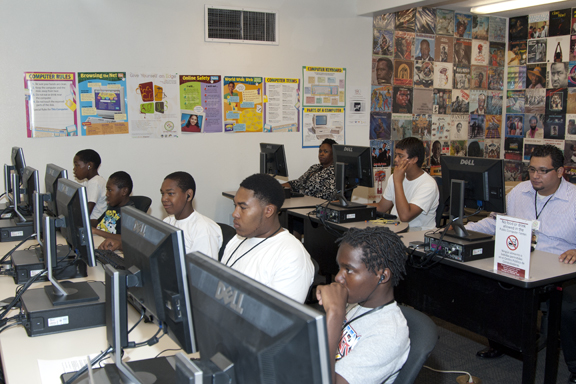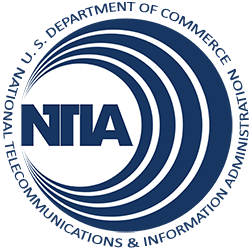NTIA Broadband Program Supports Workforce Preparation Across the United States
“It’s been great seeing people come back and say, ‘I’ve been able to get a job,’ after we helped them with sprucing up their résumé and applying for jobs online.” - PCC Staff Member, Las Vegas Urban League
“Without this computer lab, we would not be getting people the jobs that we’re getting them. It’s just a great thing.” - Staff Member, Workforce West Virginia
Last week, President Obama signed the Workforce Innovation and Opportunity Act aimed at creating a more flexible and responsive system of workforce development to meet the needs of employers looking to fill 21st century jobs. Ensuring U.S. workers are able to compete and succeed is a key priority at the U.S. Commerce Department. Secretary of Commerce Penny Pritzker served on a task force with Vice President Biden that recently released a report looking at solutions for making the nation’s workforce and training system more job-driven, integrated and effective.
At the Commerce Department’s National Telecommunications and Information Administration (NTIA), workforce development is a priority of our broadband grant programs. Grant recipients have helped unemployed and under-employed people learn to use computers and the Internet for job searching, skill-building, resume development and networking. Today, in keeping with the Department’s commitment to helping match skilled workers with good jobs, we are releasing four case studies on employment-related impacts of our broadband projects. The reports, prepared by independent contractor ASR Analytics, examined the effectiveness of the more than $450 million in matching grants, provided under the American Recovery and Reinvestment Act of 2009, to establish or upgrade public computer centers and initiate innovative broadband adoption programs in underserved communities.
The first report focuses on Workforce West Virginia (WFWV). The agency is responsible for promoting employment and job growth in West Virginia, which has chronically high rates of poverty and unemployment. The grantee upgraded 19 workforce centers and 75 additional centers in locations such as libraries and veterans’ support organizations, with new computers and Wi-Fi. In addition to serving thousands of low-income and unemployed patrons each week, the WFWV centers experienced measurable productivity gains as a result of patrons’ ability to search for jobs, prepare resumes and practice computer skills more independently. This has allowed staff to spend more time focusing on specialized assistance. The high-speed network has also made intra-agency communication and technology management faster and more reliable.
The second report examines a grant awarded to South Carolina Technical College System (SCTCS), which serves all of South Carolina through 16 colleges with multiple campuses. By locating public computer centers strategically, the grantee was able to provide high-speed Internet access (including Wi-Fi) and computers within a half-hour drive of anyone in the state. In 2012, more than 50,000 people visited these centers each week to pursue post-secondary education, take digital literacy classes, and search for jobs. SCTCS provided more than 150,000 training hours during the project, one third of them focused on workforce readiness. As one student told the ASR research team, “This class has helped me with Word, Excel, PowerPoint and the rest of Microsoft Office. My office skills are much improved. … My confidence with computers has also improved.”
The third case study released today examines the C.K. Blandin Foundation, a private foundation that serves rural Minnesota, especially its home area in Grand Rapids. Foundation officials realized early that broadband access was a key enabling factor in promoting and preserving rural communities, and applied for a BTOP grant to carry out a multifaceted program called “Minnesota Intelligent Rural Communities.” Using a model adapted from the Intelligent Community Forum, 11 local communities and nine partners assessed their own broadband needs and engaged a wide spectrum of community members in planning how to meet those needs. Additionally, since broadband adoption was the focus of this grant, C.K. Blandin staff engaged other partners with expertise in economic development, health care and social services. The Minnesota Department of Employment and Economic Development developed a user-driven, scenario-based curriculum for digital literacy, funded by the foundation, which was delivered in 30 work force centers throughout the state and translated in to Spanish and Somali. The project increased broadband subscriptions in rural areas by more than 56,000 households and helped revitalize participating rural communities. As one local business owner commented, “We’ve turned a corner and become a community that’s actually growing and thriving instead of stagnant and dying.”
The final report released today examines NTIA’s grant to the Las Vegas Urban League (LVUL), which is a nonprofit organization that serves lower-income residents of southern Nevada and focuses on education, economic development and community empowerment. LVUL established or upgraded 33 public computer centers in housing developments, community organizations and senior centers. Training in resume development, office computer skills and job search was provided to a diverse audience that included youth in foster care and people with disabilities. To increase the program’s impact, LVUL developed a curriculum tailored to the needs of the target populations. The program helped many residents, including a 50-year-old man who had not worked in five years but obtained a job as a result of the training he received through the program. A mother, unemployed for two years and living in a shelter with her son, found employment after receiving training and job counseling at a LVUL public computer center.
The remaining reports will be released in the weeks ahead. Together, they will help serve the needs of the research and policy communities for years to come as we apply the lessons of our broadband programs to build the nation’s broadband capacity.

Las Vegas Urban League: Young visitors to the Doolittle Community Center use the free Internet access to work on school projects.
